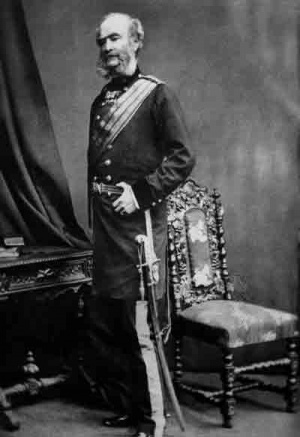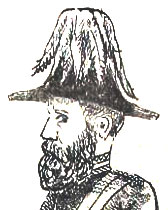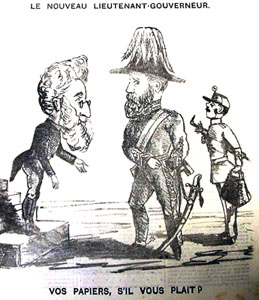William Norcott & Frances Durant

 Husband
Husband
- name: William Sherbrooke Ramsay Norcott
- parents: Amos Godsill Norcott and Elizabeth Noble
- born: 12 Dec 1804, in Chelmsford, Essex, England
- died: 23 Jan 1886 age 81 in St. Leonard's-on-Sea, Sussex, England.
Wife
- name: Frances Marrianne Durant
- born: 8 Oct 1827/8 in Brussels, Belgium
- parents: George Stanton Eld Durant & Lucinda Saunders
- married: 4 July 1848 in Hove, Sussex, England
Children
- Charles Hawtrey Bruce Norcott, b. 25 Apr 1849 in Quebec, Canada. He became a General of the Rifle Brigade.
- Walter Gordon Norcott, b. abt 1851 in Hove, Sussex, England. Educated Cheltenham College and Sandhurst. Lt Col in British Army. Address in 1911; 2 Grange Gardens, Eastbourne.
- Unknown Male: There is a birth notice in 'The Standard' London, August 5 1853. "On the 2nd inst., at Brighton, the wife of Major Norcott, Rifle Brigade, of a son" (source: www.newspaperabstracts.com)
- Mabel Eliza Norcott, b. 1854. She married Charles Frank Pedley Jones, b. 1860. and had at least two children: Gerald William Jones, b. 1882, d. 1908. and Hugh Norcott Durant, b. 1883, d. 24 Mar 1948 in London, England. Hugh married 3 February 1913, Lily Horatia Ethel Georgiana Somerset, b. 6 June 1888, (daughter of Raglan Turberville Henry Somerset and Elizabeth Horatia Anne Nelson-Ward). and had child Celeste Horatia Agnes Blanche Durant, b. 14 Aug 1914, d. 22 Jun 1933.
- Gerald Alfred Norcott, b. abt 1861, baptised 05 July 1860 in South Bersted, Sussex, England, d. 26 Feb 1917, buried in St Andrew’s Cemetery, Newcastle, UK. His grave inscription reads: "Sacred to the memory of Gerald Alfred Norcott major (retired) Royal North Lancashire Regt died February 26th 1917 aged 56 son of the late Genl Sir William Norcott KCB Christi crux est mea lux."
There is also a reference to the daughter of William being Ada Norcott. Was this another, or the shortening of the name Mabel Eliza. ref
Caricature from La Voix des Îles 11 October 1873. Bailiff of Jersey Jean Hammond greets new Lieutenant Governor of Jersey Sir William Sherbrooke Ramsay Norcott (sworn in 13 October 1873) |
Details
William was born on 12 December 1804 in Chelmsford, Essex, England. He was the son of the British Army General Sir Amos Godsell Robert Norcott and Elizabeth Noble.
William (known as Ramsey or Ramsay) followed in the footsteps of his father in the British Army (Rifle Brigade), joining in 1822.
He was an officer to the Rifle Brigade: 2nd Lietennant 13 June 1822, Lietennant 16 June 1825, Captain 21 Feb 1840, 52nd Regt; then reappointed to Rifles, 7th Aug, 1840, then a Major on 1st August 1847 (ref 1).
He served with the 2nd Battalion in the Crimean War and later commanded the 1st Battalion there and a brigade for a short time. He was ADC to the Queen 1855-68, Lei-Govnr of Jersey 1873-1881, awarded KCB in 1877 and made General in 1879.(ref: The letters of Charles Dickens: the pilgrim edition, Google Books Search)
William married Frances Marrianne Durant on the 4th of July 1848 in Hove, Sussex, England. Her father was George E. Durant.
In 1851, the family is listed on the English census, living at 4 Brunswick Place, Hove Sussex. (In 1891, after the death of William, Frances is living in Hastings, Sussex.)
In 1855, William gave evidence to the COMMISSION OF INQUIRY INTO THE SUPPLIES OF THE BRITISH ARMY IN THE CRIMEA. Colonel Norcott, Commanding 1st Battalion Rifle Brigade, is mentioned on page 99 of the report.
http://www.crimeantexts.org.uk/sources/reports/mntevi03.html
In 1863 Colonel W Norcott wrote several letters to the times about war in 'The Invasion of the Crimea,, Alma.
=====
THE BATTLE OF THE ALMA
TO THE EDITOR OF THE TIMES.
Sir — I throw myself upon your goodness to give the enclosed letter to Mr A W Kinglake a place in your journal, for I know no other way in which to meet the extensive circulation of his recent work, the Invasion of the Crimea; and, believing that you who so stood by the soldier in the field will not deny him the advantage of your columns when it is in defence of his reputation,
I have the honour to be, Sir,
Your most obedient servant,
W NORCOTT, ColonelTours, France, March 17
Belle Vue, La Tranchée, Tours, France, March 17
Sir,— In the second volume of your Invasion of the Crimea, which I have only just seen, and at page 253, in describing the position of the English army on its advance towards the Alma, is the following paragraph:-
‘Immediately on Sir De Lacy’s left the Light Division, preceded by Norcott with a wing of the 2d Rifle Battalion, in skirmishing order, moved forward under Sir George Brown.’
And at page 306, when asserting that a well-ordered assault was open to the assailants of the Great Redoubt, you express yourself as follows:-
‘To storm a position thus held in strength by forces of all arms, and to answer at the same time for the safety of the Allied Army against a flank attack, was a task of great moment; but, on the other hand, Sir George Brown was not without means for preparing a well-ordered assault, for the enemy was making no attempts to hold the vineyards in strength; and on the Russian side of the river the bank, though very steep, and from 8 feet to 15 feet in height, was yet so broken that a skirmisher seeking to bring his eye and his rifle to a level with the summit would easily find a ledge for his foot. Here, then, was exactly the kind of cover which the assailants needed; for if this steep bank could be seized and lined for a few minutes by their skirmishers it would enable their main body to recover its formation after passing the river. But in order to lay hold of the advantages thus offered by the nature of the ground it was of necessity to take care that the advance of the Light Division should be amply covered by skirmishers. This was not done. The Rifles under Norcott had long before scoured the vineyards, but they had swerved away towards the left, and, fording the river higher up, had left Codrington’s brigade without any skirmishers to cover its advance. No other light infantrymen were thrown forward in their stead, and the whole body went stark on with bare front driving full at the enemy’s stronghold.’
This paragraph briefly summed up reads thus:— Had Norcott, whose place was in Codrington’s front, been where he ought to have been, the main body would have recovered its lost formation, and the result of the assault have been very different from what it was.
This, Sir, is hard if it be unfounded, and never were detailed circumstances so utterly opposed to known facts! This being the case, you may, perhaps, understand how they have been read by a soldier who, having served upwards of 37 years, had retired with the cheering recollection of having rendered service on that day. I proceed to expose the unfounded paragraphs:-
With regard, then, to the first. I did not precede the Light Division, as therein stated. The wing I had the honour to command covered the flank of the division, coming up to the front only on the division deploying into line, and so necessarily in front of General Buller’s, or left brigade (my proper place), and not of Codrington’s (the right brigade), which from the first had its own skirmishers. It was in front of General Buller’s brigade, then (my proper place), that I went down into action, and in that brigade’s front, straight as a line could draw it, after passing vineyards and river, I lie exactly as shown in your plan (No. 2) of the battle.
I now come to your second paragraph.
The spot I had gained was an eastward continuation of that steep bank you speak of, and from it I noted Codrington’s brigade crossing the river, and saw his need. I at once determined to carry my wing to him, and place myself at his disposal, and did so, and if the columns of the enemy moving down upon his brigade did not take the full advantage they might have done it was — I say it boldly, for my riflemen well earned the meed — from the oblique and searching fire* my line of skirmishers was dealing out to them, as into haystacks, as, inclining to the right under the friendly cover of the bank alluded to, we gained the point proposed.
So far, then, from having left Codrington’s brigade without skirmishers, I carried support and cover to it, and so, when the moment came, had the honour to take a part with the noble hearts who went so fearlessly at the Great Redoubt — a part which Lord Raglan, in his despatch, was pleased to term material.
What I have stated I believe the whole army (there) to know, and I have no fear but that its readers of your work will pause over the paragraphs I have quoted to do me justice. But there are other than military readers; and so it is that I claim the privilege of making public this letter, trusting that, in the event of your work reaching a third edition, you will do me the only reparation in your power.
I have the honour to be, Sir,
Your obedient servant,
W NORCOTT, Colonel, late Rifle BrigadeA W Kinglake, Esq.
http://www.crimeantexts.org.uk/sources/times/t630320b.html
=====
The Times 25.3.1863 p 5
MR KINGLAKE ON THE CRIMEA
TO THE EDITOR OF THE TIMES.
Sir — I have received a letter from Mr Kinglake, in reference to that I addressed to him on the 17th inst through the medium of your columns, trusting that my good feeling may induce me to vary an expression used therein, and that I will not hesitate to address to you a line to that end.
The expression referred to is “the unfounded paragraphs,” of which, while acknowledging it was competent in me to pronounce them erroneous, he thinks I shall on reflection see the objectionable nature. I confess I do not, unless the improbable assumption be that I supposed Mr Kinglake writing wholly from conjecture, and not from some afforded statement on which to base his assertion.
My meaning was, and is, that the paragraphs in question were not founded on facts as they occurred — in other words, were erroneous; and I beg you will favour me so much as to allow me space in your journal to say so.
I have the honour to be, Sir,
Your most obedient servant,
W NORCOTT, ColonelTours, March 23
http://www.crimeantexts.org.uk/sources/times/t630325a.html
On August 13th 1873, Sir William Sherbrooke Ramsay Norcott, KCB was sworn in as Lieutenant Governor of the Island of Jersey. He was appointed in this position form 1st October 1873 until 30 September 1878. Jersey, one of the major islands of the Anglo-Norman territory of the Channel Islands became a separate administrative unit in the course of the 13th century and remained so ever since. sworn in as Lieut.-Governor
http://user.itl.net/~picus/names/governors.htm
on 20 March 1878 he became Colonel 47th (the Lancashire) Regiment of Foot
http://www.regiments.org/regiments/uk/inf/047-751.htm
William died on 23 January 1886 at age 81 in St. Leonard's-on-Sea, Sussex, England
Refereces
- An alphabetical list of the officers of the Rifle brigade, from 1800 to 1850

